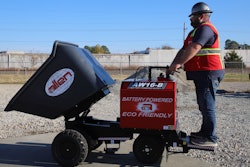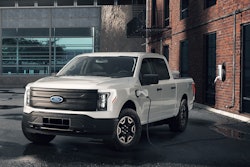
Sunbelt Rentals and United Rentals recently incorporated F-150 Lightning Trucks into their fleets.
Sunbelt Rentals released its plans in April to add 700 electric trucks as a way for the company to reduce its greenhouse gas emissions (GHG) by 35 percent by 2030.
In a similar move, United Rentals announced in May that it would incorporate 500 F-150 Lightning trucks and 30 E-Transit vans into its North American fleets, with 120 trucks and all 30 vans to be delivered in 2022.
Leaders at the two companies explain the decision.
Sustainability Goals
Both rental companies purchased the electric vehicles for their fleets to become more sustainable organizations.
"Sunbelt Rentals has a carbon intensity reduction target that comes with a commitment to lead the movement toward electrifying our fleets and to strive for environmental stewardship," says Eric Jahnsen, director of transportation fleet, Sunbelt Rentals. "This investment will also benefit our total cost of ownership for our fleets well into the future since electric vehicles are less expensive to maintain in the long term."
United Rentals noted that it has set a GHG goal to reduce its scope 1, 2 and 3 emissions from outside hauling by 35 percent by 2030 from a 2018 baseline.
"Our largest scope 1 emission source is from our sales, service and delivery fleet. Having a fleet turnover plan for these vehicles will assist us in achieving our goal," says Grant Zoldowski, director of environmental management at United Rentals. "The benefits include shifting our emissions from direct fuel burning to using energy from the electric grid, which has lower GHG emissions. Additionally, initial feedback indicates the vehicles are quieter and have more performance."
Zoldowski adds that when calculating the usable life of an internal combustion engine asset, the limiting factors are usually related to the drivetrain because those components are the most expensive to replace, but with an electric vehicle, the only expensive part to replace is a battery, which is expected to operate for much longer. Additionally, fewer parts equal less maintenance, hard costs and downtime.
On the other hand, some of the initial challenges of implementing the electric trucks include finding charging infrastructure and power availability and limited range, so it's important to introduce the electric vehicles in a market that can support them, according to Zoldowski.
What To Expect
For other rental companies looking to make a similar transition, Zoldowski and Jahnsen recommend ensuring the market can support the electric vehicles with the right infrastructure.
"While the cost of electricity is less volatile than gas and diesel—making it easier to budget vehicle running costs—there are charging considerations to keep in mind," Jahnsen says. "Opportunity charging will be a key factor in a fleet’s ability to adopt electric vehicles. Operators of these vehicles will need to change their normal thinking of filling up on gas when the gauge shows a quarter full and shift to a mindset of plugging in when there’s a nearby outlet. They also need to consider how fast and long they charge the battery—slower charges are best to extend its life with the charge optimally falling no lower than 20 percent and no higher than 90 percent.
Rental companies should also look at how the brand supports the value chain of the operation (charging, power, maintenance, etc., Zoldowski says.
Jahnsen agrees.
"Consider how the vehicle will be maintained and if there is local support for it from the OEM," Jahnsen says. "Can we count on the OEM and the parts to still exist for the electric vehicle next year or even 10 years from now?"
Looking Ahead
Moving forward, United Rentals and Sunbelt Rentals have plans to incorporate more sustainable options.
"The trend is not going to be just limited to the rental industry. We see this in major retail companies, petrochemical and other industries," Zoldowski says. "We plan to continue to keep our options open. Electric vehicle is definitely the buzz right now, but we are also keeping our eye on alternative technologies.”
Sunbelt Rentals has further plans for electric vehicles: battery electric, fuel cell electric, plug-in hybrids. The company is also providing its customers with energy storage solutions with charging capabilities.
"As we improve our electric infrastructure and the public infrastructure continues to grow, we’ll be able to accomplish even more growth in our electric vehicle fleet," Jahnsen says. "The movement to a zero-emissions future cannot be successful without a lot of businesses making well-thought-out, long-term commitments to new technology. We’re all in this together. No individual company can make this successful on their own."




















